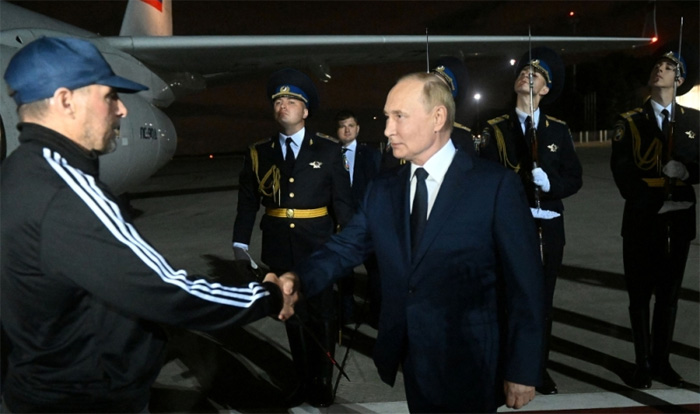Germany’s ‘deal with the devil’ in Russia prisoner swap
Germany’s release of a convicted murderer in order to facilitate the biggest East-West prisoner swap since the Cold War has garnered praise from Washington but stirred controversy at home.
Those freed in the deal include US journalist Evan Gershkovich, several high-profile Russian opposition figures and five German nationals who were being held in Russia and Belarus.
But of the countries who released Russian prisoners in return, Germany has had to pay a particularly high price, setting free a man who committed murder in broad daylight in the center of Berlin.
Russian citizen Vadim Krasikov had been serving a life sentence for the brazen assassination of a former Chechen rebel commander in the German capital in 2019, a case which shocked the country.
In his press conference celebrating the exchange, US President Joe Biden acknowledged that he “particularly” owed “a great sense of gratitude to Chancellor” Olaf Scholz.
The deal “required me to get some significant concessions from Germany, which they originally concluded they could not do because of the person in question,” Biden said.
But speaking later, Scholz acknowledged the decision to release Krasikov, who was convicted in December 2021, had been “difficult.”
After a “moving” meeting with some of the prisoners on their arrival Cologne airport, Scholz however insisted the swap was “the right decision, and if you had any doubts, you will lose them after talking to those who are now free.”
“Many of the prisoners feared for their health and even their lives,” he added.
Germany is receiving 12 of the freed prisoners, including Russian dissidents and some German nationals.
German TV channel NTV reported that there had been rows between Scholz’s office and the justice ministry over Krasikov’s case.
According to other reports in the German press, the justice ministry eventually ordered prosecutors to suspend Krasikov’s sentence to enable his deportation.
Some in judicial circles reportedly felt this was a case of inappropriate political meddling in the legal process.
The German section of human rights organization Amnesty International condemned the “bitter taste” of the deal and the fact that it had created an equivalence between “a murderer… convicted in a fair trial” and “people who have just exercised their right to free speech.”
It raised the spectre of the exchange “broadening impunity” and emboldening Russian President Vladimir Putin, who previously said Krasikov acted out of “patriotic sentiments” by “eliminating a bandit.”
An opinion piece in Germany’s Bild tabloid said that while the release of rights activists and German citizens in Russia was to be welcomed, “the perverse message given to the Russian people is that Putin is a hero” for “saving murderers.”
However, German officials have insisted the freedom and welfare of the prisoners have been safeguarded by the deal and that Berlin has a duty of care toward the German citizens involved.
Michael Roth, the head of the German’s parliament’s foreign affairs committee and member of Scholz’s Social Democrats, summed up Berlin’s decision on X: “Sometimes for reasons of humanity you have to do a deal with the devil.”
Biden trumpeted the concessions he was able to win from his allies, describing them as “bold and brave decisions” to release prisoners such as Krasikov “who were justifiably being held.”
The Spiegel weekly reported that Thursday’s swap came after “several months” of negotiations between the CIA, Germany’s BND intelligence agency and the Kremlin.
The swap was originally envisioned to include Russian opposition leader Alexei Navalny, who died in an Arctic prison in February, before the focus fell on Gershkovich and former Marine Paul Whelan.
Diplomatic contacts at the highest level were also brought to bear in securing the deal.
US National Security Adviser Jake Sullivan told reporters that conversations between Biden and Scholz led up to Vice President Kamala Harris sitting “face-to-face with Chancellor Scholz” to “talk through the elements of this” at the Munich security conference earlier this year.

